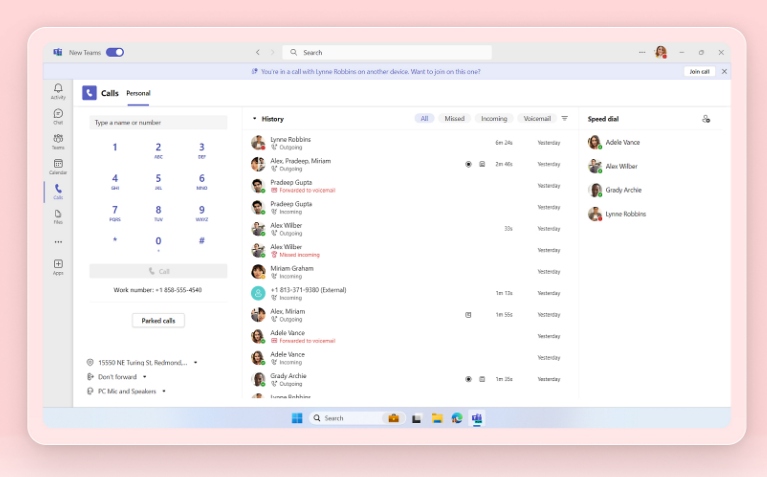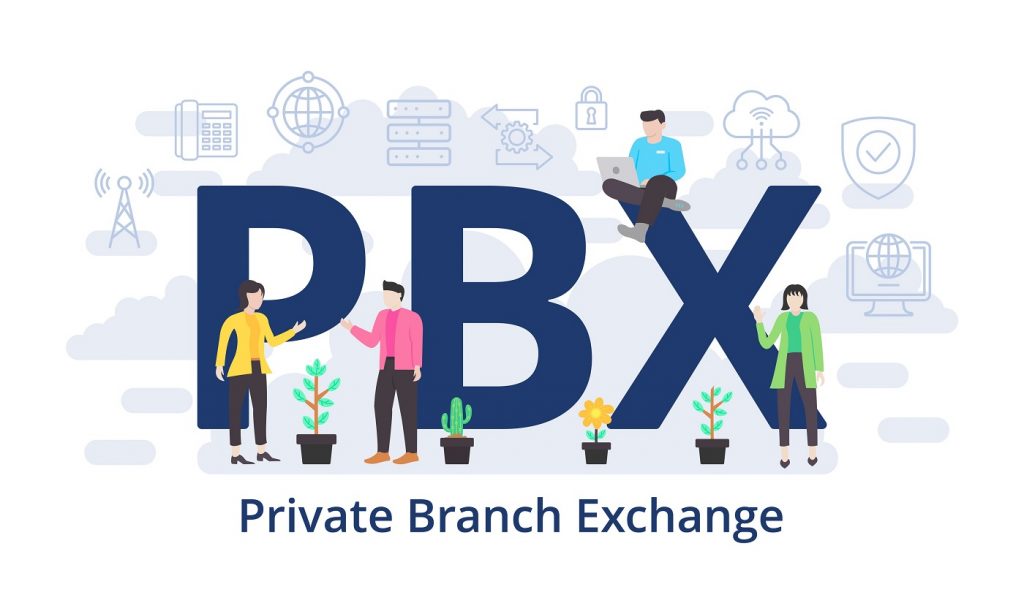The emergence of VoIP (voice-over-internet-protocol) technology has greatly benefited small businesses and startups, particularly those leading these growing enterprises. While many applications claim to offer free VoIP services, hidden fees often surface later on. In this article, I will examine how to obtain a VoIP phone service for free and discuss its advantages for small businesses and startups.
Whether you’re a freelancer juggling clients from your kitchen table, a small business owner seeking efficient ways to connect with your team, or someone looking to keep in touch with family and friends worldwide, the list below outlines the best free VoIP services moving into 2025:
- Microsoft Teams: Best overall free VoIP phone service
- Google Voice: Best for integrated team collaboration and communication
- WhatsApp: Best for small businesses and entrepreneurs
- Linphone: Best for open source customization
- Textfree: Best for North American users
- Jitsi: Best for secure open-source video conferencing
Free VoIP apps
Overall score out of 5
Key features

Microsoft Teams
4.77
- Team chat
- Voicemail to email
- Call forwarding

Google Voice
4.31
- Collaborative calling
- Spam call filtering
- Number porting

4.15
- International messaging
- Automatic greetings
- Contact labels

Linphone
3.65
- SIP protocol support
- Group calls
- Instant messaging

Textfree
3.54
- Custom phone numbers
- Multiplatform support
- Group messaging

Jitsi
3.29
- Third-party integrations
- Screen sharing
- Video conferencing
Microsoft Teams: Best overall free VoIP phone service

Microsoft Teams
Overall Score
4.77/5
Core features
4.75/5
Integration and compatibility
4.17/5
Security and reliability
5/5
Pricing and value
5/5
Customer support and usability
5/5
Advanced features
5/5
User scores
4.47/5
Pros
- Offers video conferencing, voice calls, instant messaging, and file sharing
- Integration with the Office 365 suite of tools
- Accessible from multiple devices
- End-to-end data encryption and security
Cons
- Limited cloud storage for file sharing on the free plan
- Insufficient phone system features for contact center requirements
Why I chose Microsoft Teams
Microsoft Teams is the best free VoIP phone service overall because of its holistic approach to VoIP solutions within a collaborative workspace. MS Teams offers high-quality voice calls but also integrates these calls into a user’s daily workflow alongside other collaboration tools. This integration is backed by Microsoft’s infrastructure, ensuring reliability and security for virtual meetings and business calls.
With its intuitive interface, MS Teams makes it easy to manage call flows, group chats, and emails, all from the convenience of an all-in-one platform. Unlike competitors (e.g., Slack or Zoom), Teams excels in its comprehensive VoIP features and contributions as a fully integrated solution. This integration provides a unified experience where voice communication is on par with features like file sharing and real-time collaboration.
Compared to other VoIP providers, Microsoft Teams consistently delivers high-quality voice calls, a critical factor for business communications. However, MS Teams has some limitations to its features on the free plan, which is geared towards home use and only provides about 5GB of storage for file sharing. If you need more storage to send documents within a team setting, consider Google Voice, which has access to 15GB of storage with a free account.
Google Voice: Best for integrated team collaboration & communication

Google Voice
Overall Score
4.31/5
Core features
5/5
Integration and compatibility
3.3/5
Security and reliability
3.3/5
Pricing and value
5/5
Customer support and usability
4.17/5
Advanced features
5/5
User scores
4.37/5
Pros
- Call recording and archiving
- Multiple device ring
- Porting of existing phone numbers from other services
- Easy integration with the Google ecosystem
Cons
- Limitations on bulk messaging or advertising
- One user cap on the free plan
- Lacks virtual fax
Why I chose Google Voice
Google Voice’s free tier is ideal for individual users or solopreneurs who need basic VoIP services and team collaboration tools. Its simplicity, coupled with Google’s dependable infrastructure, makes it a strong competitor in this category. Notably, Google Voice features an intuitive interface that simplifies navigation and offers excellent integration with Google’s ecosystem, including Gmail, Meet, and Google Calendar.
Each of these services is essential for managing team members, scheduling calls, and hosting virtual meetings, and many individuals adopt Google’s suite of tools as their digital workspace. At the same time, Google Voice’s evolution has been marked by a focus on VoIP services, like voicemail transcription and spam blocking, demonstrating a commitment to collaboration and business communication.
Google Voice provides excellent self-help resources for new users, including a comprehensive range of online guides and community forums. Reflecting on its evolution, Google Voice has undoubtedly come a long way, expanding its feature set and improving user experience. However, it retains its core focus on basic VoIP services without branching extensively into the more advanced telephony features that some businesses might require.
However, the cons are notable. The Google Voice phone service lacks advanced features like virtual fax and automated attendants, and its free tier offers limited customer support. Due to the fact that the free version of Google Voice is a personal plan, there are also limitations on business messaging. For access to more VoIP services, consider Microsoft Teams, which specializes in team collaboration tools, or WhatsApp, which offers a service for businesses to message customers.
WhatsApp: Best for small businesses & entrepreneurs

Overall Score
4.15/5
Core features
4/5
Integration and compatibility
4.17/5
Security and reliability
4.17/5
Pricing and value
4.58/5
Customer support and usability
4.17/5
Advanced features
3.33/5
User scores
4.67/5
Pros
- Custom welcome greetings
- Business app for customer engagement
- Free international messaging
- Automatic away messages
Cons
- Business verification with Meta incurs an additional fee
- Lacks advanced call management features
- Doesn’t offer call recording
Why I chose WhatsApp
WhatsApp is among the most popular messaging apps, offering free domestic and international messaging for users worldwide. However, many people aren’t aware that the app also provides a Business app with a free VoIP phone service and calling features that engage audiences and help increase sales.
The Business app lets you set up a business phone number to separate your personal calls from customer interactions. This number can also include customizable welcome greetings to introduce your business and automatic away messages after business hours. Because WhatsApp is a subsidiary of Meta, it also offers integrations with social media platforms like Facebook and its Marketplace. This integration benefits small business owners who use social media to advertise and sell their products.
At the same time, WhatsApp lacks some call management features that business owners with more complex phone systems may require, such as advanced call forwarding and transfers. Also, WhatsApp does not offer call recording, so users must rely on a third-party app to record calls. If you need call recording or access to more advanced features, consider using Google Voice.
Linphone: Best for open source customization

Linphone
Overall Score
3.65/5
Core features
4/5
Integration and compatibility
3.33/5
Security and reliability
2.5/5
Pricing and value
2.92/5
Customer support and usability
3.33/5
Advanced features
5/5
User scores
4.47/5
Pros
- Customizable features, such as branding, icons, and themes
- Easy setup and implementation
- Advanced configuration options
- Works well with services like LiveAgent
Cons
- Slightly confusing interface
- The web version is currently unavailable
Why I chose Linphone
Linphone is a free, open-source platform based in France, which sets it apart from many commercial VoIP solutions. This aspect allows for a high degree of customization and technical flexibility, appealing to users with the technical know-how to fully exploit its capabilities. Its strong call quality and compatibility performance also make it a viable option in the free VoIP software category.
Over the years, Linphone has expanded its capabilities to include instant messaging and conference calling, adapting to the growing needs of its users. This makes Linphone particularly appealing to those interested in creating a collaborative workspace. For instance, it is an excellent choice for tech-savvy users or organizations that value customizing their VoIP solutions with branded elements.
However, Linphone’s open-source nature also brings certain drawbacks. The software’s learning curve can be steep for those new to VoIP technologies, and while it offers a range of self-help resources, the lack of immediate customer support might be a challenge for some users. Microsoft Teams might be more suitable for those seeking extensive customer support and advanced features straight out of the box.
Textfree: Best for North American users

Textfree
Overall Score
3.54/5
Core features
3/5
Integration and compatibility
3.33/5
Security and reliability
2.5/5
Pricing and value
5/5
Customer support and usability
5/5
Advanced features
3.33/5
User scores
2.6/5
Pros
- Unlimited calls and texts
- Custom phone numbers with your choice of area code
- Multiplatform support for iOS, Android, and desktop
Cons
- Doesn’t support conference calling
- The free version includes ads
- Must be located in the US or Canada to use the service
Why I chose Textfree
Textfree by pinger is recommended as the best free VoIP for North American users primarily due to its regional optimization, which ensures high-quality call and text services within the US and Canada. Its user-friendly interface, coupled with the essential features it offers, makes it an ideal choice for individuals or small businesses looking for a straightforward, reliable secondary communication line.
While it may not boast an extensive list like some paid services in terms of feature richness, its core offerings of unlimited calls, texts, and a free local number are robust for a free service. It also stands out from other providers by offering unique personalization features, like custom wallpapers and group messaging, with the ability to send custom reactions and GIFs. Therefore, Textfree is excellent for sharing informal messages with coworkers, family, and friends.
However, while Textfree offers simple VoIP phone services for North American users, it doesn’t provide international calling or texting. Users with a global clientele or an interest in communicating outside their country of origin should consider WhatsApp, which offers international calling and messaging.
Jitsi: Best for secure open-source video conferencing

Jitsi
Overall Score
3.29/5
Core features
3/5
Integration and compatibility
2.5/5
Security and reliability
2.92/5
Pricing and value
2.5/5
Customer support and usability
2.92/5
Advanced features
5/5
User scores
4.17/5
Pros
- Free and open-source video conferencing for meetings and live-streaming
- Calendar integrations for call scheduling
- No account needed
- Community-based support and development
Cons
- Limited chat features
- Consumes a lot of memory
- Doesn’t have access to emergency calling
Why I chose Jitsi
Jitsi is an excellent choice for those who value open-source flexibility, high-quality video conferencing, and strong VoIP security features. The platform began as a simple messaging tool and has since expanded to become a platform for video conferencing and collaboration with multiple projects, such as Jitsi Meet and Videobridge. Its strong performance in call quality and compatibility makes it a viable option for those looking to host meetings with team members or stream content to a live audience.
When compared to other VoIP solutions, Jitsi stands out for users who prioritize security and customization. Over the years, Jitsi has undergone numerous upgrades, significantly enhancing its video and audio quality while integrating end-to-end encryption. This feature has been a game-changer in terms of security, providing a significant advantage over many commercial VoIP solutions, especially in an era where data privacy is paramount.
However, this strength also presents a notable drawback: the learning curve can be steep for those unfamiliar with open-source platforms. Additionally, while Jitsi offers excellent self-help resources, its customer support is primarily community-driven, which might not suffice for users seeking immediate professional assistance. A solution like Linphone might be better for those seeking a more traditional VoIP experience.
Key components of free VoIP apps
Free VoIP apps, in particular, offer a range of functionalities that cater to basic communication needs. Understanding the key components of these apps can help users make informed decisions about which app best suits their needs. Below are some of the VoIP protocols and elements commonly found in free software:
- Voice and video calls: The core functionality of any VoIP app is to facilitate voice and video calls over the internet. These calls typically offer decent quality and can be made to other users of the same app and sometimes to phone numbers.
- Messaging capabilities: Alongside voice and video, instant messaging is a staple feature, allowing users to send text messages, images, videos, and files.
- User interface (UI): A user-friendly interface is crucial for ease of use. Free VoIP apps usually have a simple, intuitive design that makes navigation and operation straightforward for all users.
- Multi-platform support: Many free VoIP apps are available across various platforms, including Windows, macOS, iOS, and Android, ensuring accessibility regardless of the device.
- Group communication: The ability to conduct group calls and chats is vital, especially for collaborative tasks in a business environment or for group interactions for personal use.
- Security and privacy: Even free apps should offer a basic level of protection. Features like end-to-end encryption for calls and messages are becoming more common to protect user privacy.
- Integration with other apps: Some VoIP apps integrate with other applications, such as email clients, calendars, and productivity tools, to provide a more seamless user experience.
- Contact management: A critical component is efficiently managing contacts within the app, including adding, organizing, and syncing contacts from other sources.
- Call quality and reliability: A VoIP app’s effectiveness largely depends on the quality and reliability of its calls, which can vary depending on internet connectivity and uptime guarantees.
- Customer support and community: While free apps may not offer extensive customer support, many have community forums and help centers where users can seek assistance.
Benefits of using a free VoIP service for small businesses
Voice-over-internet protocol (VoIP) offers several advantages that align seamlessly with their unique needs and constraints. Click on the tabs below to learn how a free VoIP service can benefit your business.
Cost efficiency is at the core of these advantages, especially for small businesses with limited budgets. Free VoIP services eliminate the significant costs associated with traditional phone systems, including installation fees, maintenance, and long-distance charges. This financial relief enables small businesses to manage their resources more effectively, allowing them to invest savings into other areas that promote growth.
In addition to their cost-saving benefits, free VoIP services provide impressive scalability and flexibility. Small businesses often experience varying growth patterns, and these services can quickly adapt to changes in call volume and workforce size without requiring significant infrastructure changes. This scalability ensures that communication systems develop alongside the business, offering a reliable foundation for expansion.
VoIP integration capabilities allow it to connect with various business applications, including customer relationship management (CRM) systems and email platforms. This connectivity streamlines workflows and enhances overall productivity. Business integrations create a more cohesive operational environment and improve customer experience, which is essential for small businesses that aim to build strong, lasting relationships with their clients.
VoIP services provide mobility that fits seamlessly with an ever-changing work culture, where remote work and mobile operations are now commonplace. Employees can access VoIP systems from any location with an internet connection, ensuring that business communication remains uninterrupted. This flexibility benefits employees and guarantees that customer inquiries and opportunities are addressed without being hindered by geographical limitations.
Which free VoIP service is right for your business?
Lastly, the feature-rich nature of VoIP services, even the free versions, gives small businesses a competitive edge. Features such as call forwarding, voicemail, and conference calls, which were once the domain of larger corporations with substantial budgets, are now accessible to small businesses. This democratization of technology empowers small businesses to operate with professionalism and efficiency that was previously beyond their reach.
Looking for more low-cost and affordable VoIP services? Check out our cheapest VoIP phone service buyer’s guide.
Frequently asked questions (FAQs)
The best part about a VoIP phone service is that you only need an internet connection, a VoIP-enabled device, and a free VoIP service provider to access voice calling and other features.
Yes. Many free VoIP software options offer sufficient features for small businesses and startups for basic communication needs. For example, WhatsApp offers a free business app to communicate with customers through a VoIP phone service.
Yes, most VoIP providers offer free number porting so that you can keep your previous business phone number. Just make sure to research any requirements your provider has regarding virtual numbers and porting.











